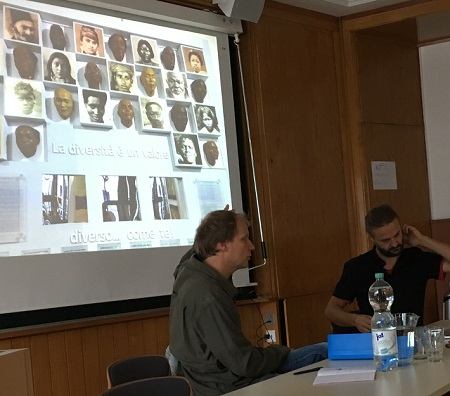The midterm-meeting for the research project TRACES (Transmitting Contentious Cultural Heritages with the Arts, 3/2016 – 2/2019) was held at Humboldt University, Berlin, from the 25th to the 29th of September, 2017. TRACES seeks to address how people across Europe relate to contentious heritage, and has brought together academics and artists from seven European countries. Prof. Arnd Schneider, who participated along with his scientific assistant Magnus Godvik Ekeland, is responsible for supervising the members of Work Package two, who are undertaking ethnographic fieldwork in selected locations.
Workshops and discussions
The midterm-meeting gave the members a long awaited opportunity to familiarise themselves with their colleagues’ research and exchange experiences from their respective fields. While members of TRACES have been working all across Europe, from Transylvania to Belfast, covering such topics as post-Holocaust art, death masks and skull collections, the methodological and theoretical challenges they faced have often been similar.
A key intention of the conference was thus to create a platform for discussing challenges and issues arising from working with contentious topics. Over the course of the week, participants came together in smaller workshops where they worked on specific case studies taken from the field experiences of the associated researchers. These dealt with a range of different topics such as contentious museological collections and methodological challenges. These workshops were an excellent exercise for everyone to reflect on common challenges. It was also a refreshing opportunity for the researchers who submitted the case studies to consider their data material and field experiences from new and exciting angles.

Arnd led one workshop where participants were asked to reflect on an interview he had conducted where the subject avoided answering questions about contentious issues. A productive discussion followed with some of the main topics for discussion being avoidance strategies, our relationship to atrocities in European history, as well as how our national background might unintentionally affect the responses we get. Throughout the conference a recurring theme was public dissemination. How to identify the stakeholders and strategies for attracting broader public attention spawned intense discussions and gave productive results.
Contentious history
On the 28th and the 29th of September, TRACES came together with another EU-funded research project COHERE (Critical Heritage: Performing and Representing Identities in Europe) in a two-day international conference ‘Critical Heritage and Reflexive Europeanization’. The stated aim of the conference was to introduce the public to the most up-to-date research conducted on heritage practise and narratives, in light of the current cultural context.
As Axel Klausmeier, Director of the Berlin Wall Foundation, touched upon in his welcoming speech, representing the diversity in European heritage includes recognising how neglected narratives and practises from the margins of our continent are more important now than ever given the current political climate. Holding the conference in the Berlin War Memorial was perhaps a suitable location, reminding the attendees of contentious actions from the recent past.
The conference was divided into different cross-thematic panels where researchers from the two projects where invited to give a short presentation of their research and speak about some of their preliminary findings. Arnd gave a talk together with artist Leone Contini about their exhibition project in Rome titled “Bel Suol d’Amore - The Scattered Colonial Body” as part of the panel on “Performing Heritages”. In this research project, Arnd and Leone had tracked down and later displayed selected objects from older colonial collections, held now in different museums across Rome. An underlying theme for the presentation was how the Italian state has yet to fully recognise and acknowledge its contentious colonial history.
TRACES will continue to February 2019 and eventually lead to several publications. In line with the project’s adherence to the open access policy, all publications will be freely accessible for fellow scholars and the larger public.
Apart from collaborating with the main publication, Arnd will edit a volume with contributions from the fieldworkers, with a focus on engagements with contemporary art. In the meantime everyone is invited to follow the TRACES Facebook page, which is updated regularly with information about the current status of our research and exciting upcoming events across Europe.
